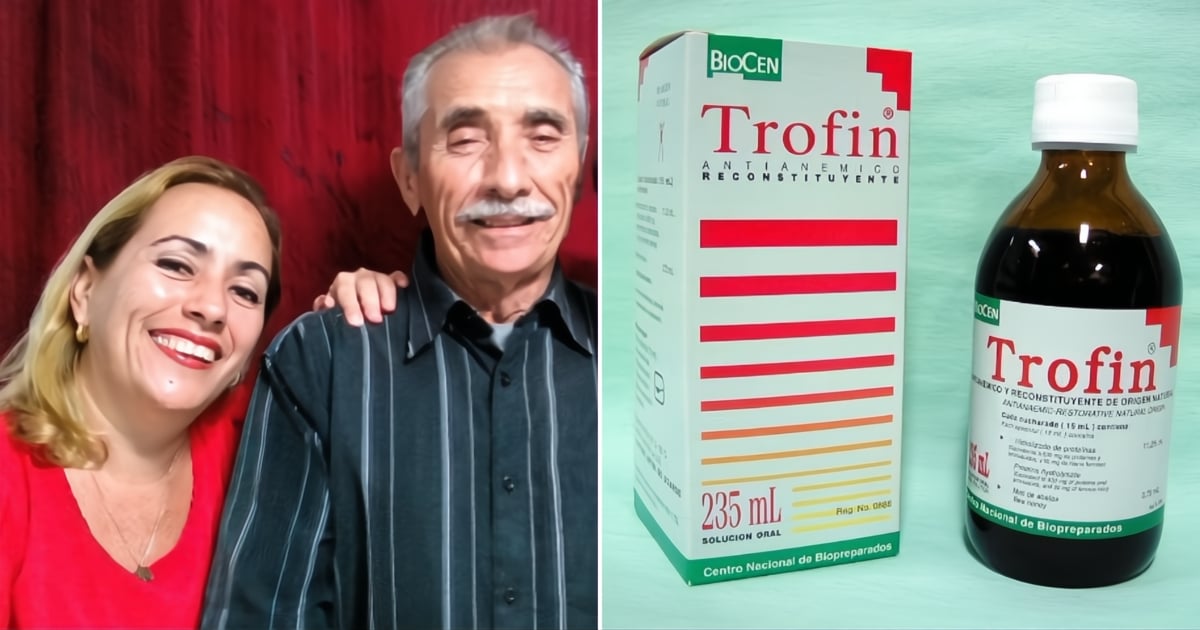
Related videos:
Elizabeth González Aznar, daughter of Doctor in Sciences Raúl González Hernández, creator of the anti-anemic medication Trofin, revealed that her father has been forced to beg for the medication for his family members. Despite the seriousness of her allegations, she stated that she does not fear reprisals, as she believes that the institutional indifference toward him has been evident since his retirement.
González explained on Facebook that they have had to rely on gestures of solidarity from third parties to obtain jars of the product that has brought so much benefit to Cuban health, but whose acquisition has become nearly impossible.
In that regard, he expressed his gratitude to those who have helped them, even at the risk of potential reprisals.
"I am extremely grateful for the jars of Trofin that I have been able to obtain thanks to many people, including the workers from BioCen, whose names I will withhold to avoid any trouble," he noted.
However, despite that, she stated that she feels at ease with her decision to make the situation public, emphasizing that her father deserves all the support and recognition for the years of work and sacrifice he dedicated to the development of Trofin.
"Many are concerned about the consequences, censorship, reprisals, some form of reprimand, and those things that we know happen, but honestly, I don't think so," she noted.
He believed it would be "logical" to receive some kind of call from the management of BioCen or BioCubaFarma; however, he indicated that he doesn't think they will: "Since my dad retired, there have been several gestures, signs, and actions of 'we don't care about you,' 'you are no longer needed,' which make us sure that nothing will happen."
However, her stance is not without risks, yet it highlights her strong resolve to speak out in defense of her family's efforts and legacy
In her message, she recalled that in the past, she had chosen silence in similar circumstances following the loss of her mother, but now, with her father still alive, she could not remain silent.
González's complaint has sparked a wave of solidarity on social media, where thousands of people have sent messages of support and expressed their outrage at the institutional indifference towards the creator of Trofin.
On December 3rd, while the Cuban regime "honors" the doctors, it is timely to remember that other workers in the healthcare sector, who also take this day as an opportunity to receive congratulations, face hardships and abandonment from the government once they reach retirement.
39% of Cuban retirees receive the minimum pension, a concerning figure that becomes even more striking when translated into absolute numbers. Of the 1.7 million beneficiaries of Social Security in Cuba—including pensions, maternity protection, and individuals with partial disabilities—almost four out of ten retirees receive only 1,528 pesos per month.
The number of retirees receiving the minimum pension has been confirmed to the state media by Virginia Marlene García Reyes, the Director General of Social Security at the Ministry of Labor and Social Security.
According to statements made to Cubadebate, the government allocates 40 million pesos for pension payments amid an inflation rate that has stubbornly remained above 30% in 2023.
These figures place a large segment of the Cuban population in a difficult predicament: What can a retiree buy today with 1,528 pesos?
Frequently Asked Questions about Dr. Raúl González Hernández and the Antianemic Trofin
Who is Dr. Raúl González Hernández?
Dr. Raúl González Hernández is a prominent Cuban scientist best known for developing the anti-anemia medication Trofin. His career has focused on the research and creation of biopreparations, yet despite his significant contributions, he faces challenges in accessing his own medication and a lack of official recognition in Cuba.
What is Trofin and why is it important in Cuba?
Trofin is an anti-anemic medication developed in the 1990s by Dr. Raúl González Hernández. It is primarily used to treat anemia in patients who do not tolerate conventional treatments. Its significance lies in its effectiveness and the positive impact it has had on public health in Cuba.
Why is Dr. González Hernández facing difficulties in obtaining the Trofin?
Dr. González Hernández is facing difficulties obtaining Trofin due to the shortage of the medication in Cuba and the lack of recognition and institutional support following his retirement. Despite being the creator of Trofin, the Cuban system does not prioritize him for access to the medication.
How does the lack of recognition affect scientists in Cuba?
The lack of individual recognition impacts both access to benefits and personal dignityFrom the scientists in Cuba. The country's intellectual property policies register discoveries under the names of institutions, overshadowing individual contributions and leaving many scientists without the respect and recognition they deserve.
Filed under: